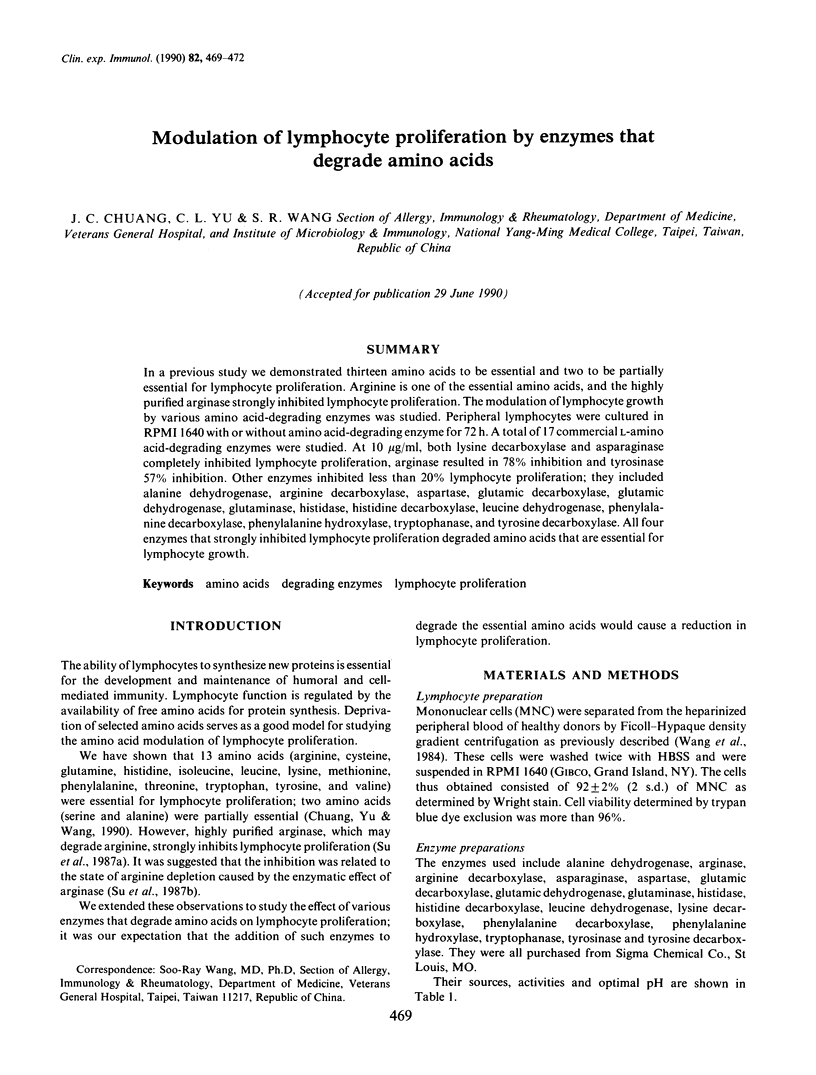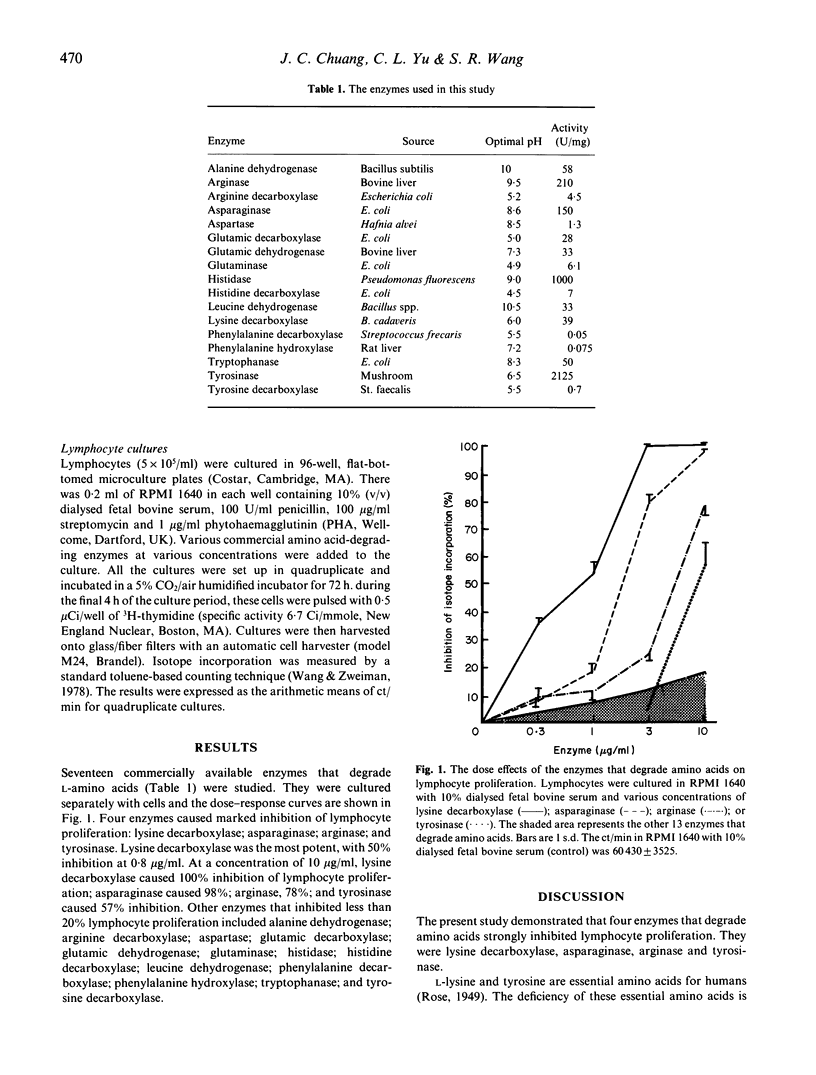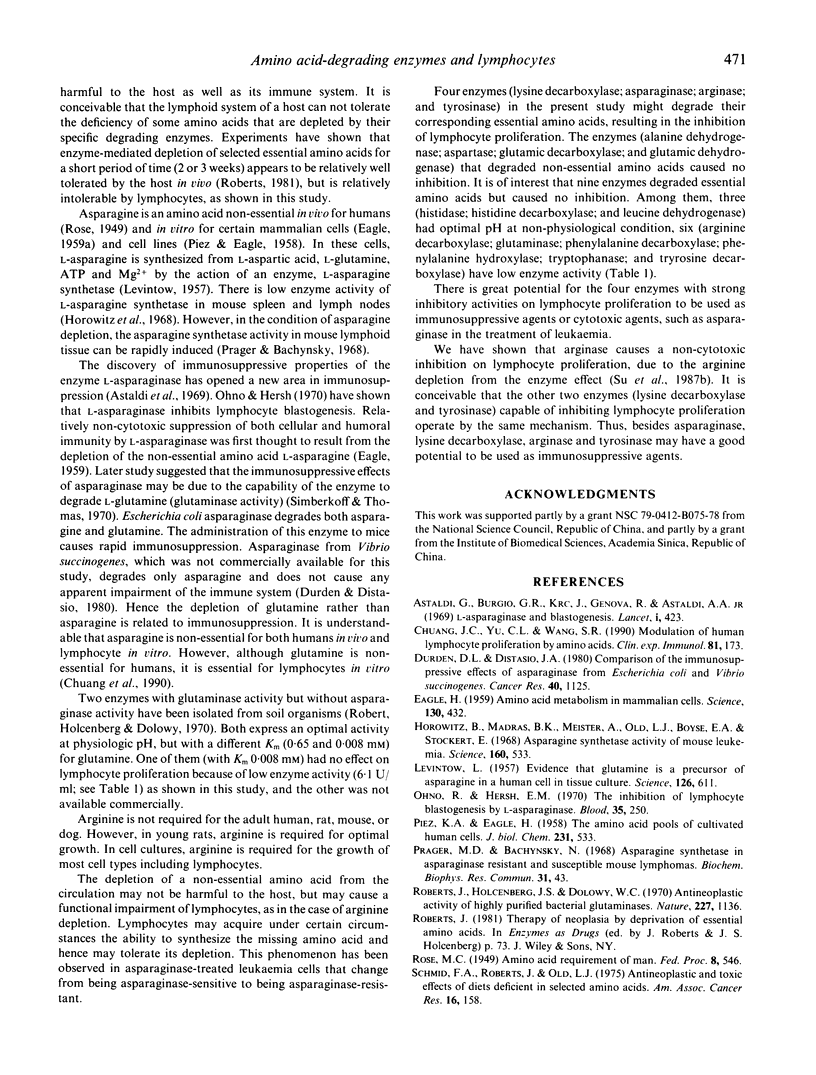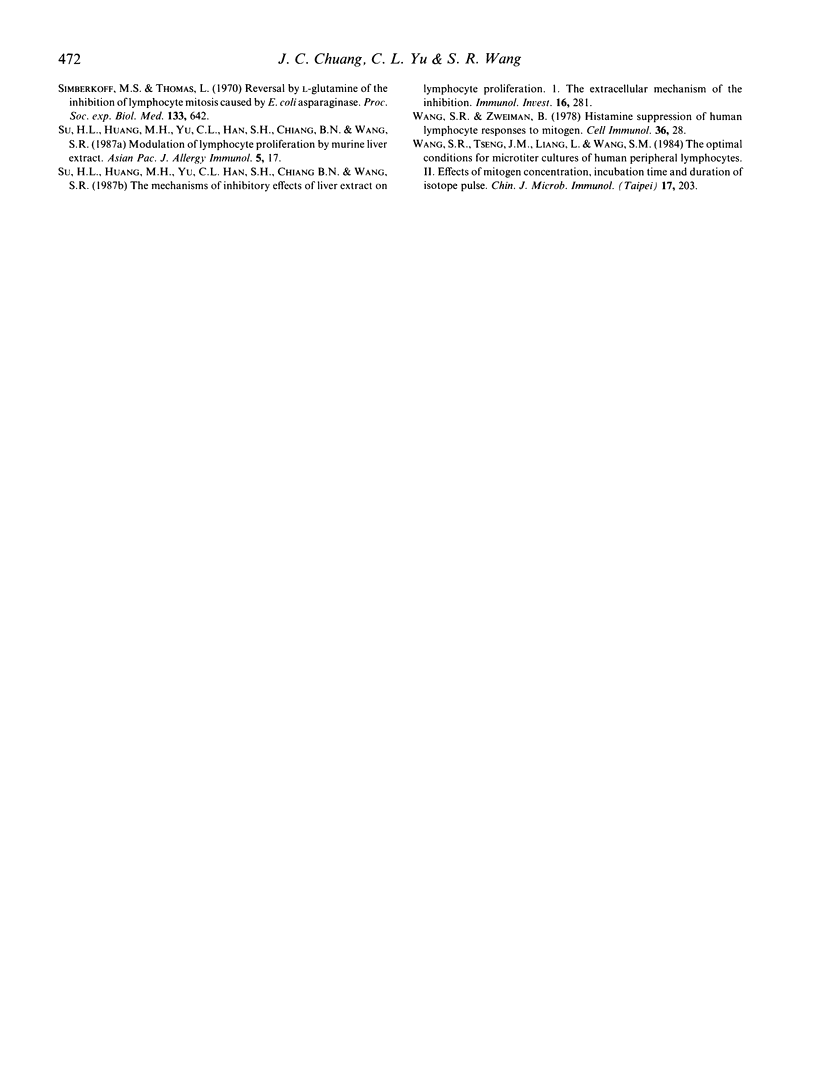Abstract
In a previous study we demonstrated thirteen amino acids to be essential and two to be partially essential for lymphocyte proliferation. Arginine is one of the essential amino acids, and the highly purified arginase strongly inhibited lymphocyte proliferation. The modulation of lymphocyte growth by various amino acid-degrading enzymes was studied. Peripheral lymphocytes were cultured in RPMI 1640 with or without amino acid-degrading enzyme for 72 h. A total of 17 commercial L-amino acid-degrading enzymes were studied. At 10 micrograms/ml, both lysine decarboxylase and asparaginase completely inhibited lymphocyte proliferation, arginase resulted in 78% inhibition and tyrosinase 57% inhibition. Other enzymes inhibited less than 20% lymphocyte proliferation; they included alanine dehydrogenase, arginine decarboxylase, aspartase, glutamic decarboxylase, glutamic dehydrogenase, glutaminase, histidase, histidine decarboxylase, leucine dehydrogenase, phenylalanine decarboxylase, phenylalanine hydroxylase, tryptophanase, and tyrosine decarboxylase. All four enzymes that strongly inhibited lymphocyte proliferation degraded amino acids that are essential for lymphocyte growth.
Full text
PDF



Selected References
These references are in PubMed. This may not be the complete list of references from this article.
- Astaldi G., Burgio G. R., Krc J., Genova R., Astaldi A. A., Jr L-asparaginase and blastogenesis. Lancet. 1969 Feb 22;1(7591):423–423. doi: 10.1016/s0140-6736(69)91400-7. [DOI] [PubMed] [Google Scholar]
- Chuang J. C., Yu C. L., Wang S. R. Modulation of human lymphocyte proliferation by amino acids. Clin Exp Immunol. 1990 Jul;81(1):173–176. doi: 10.1111/j.1365-2249.1990.tb05310.x. [DOI] [PMC free article] [PubMed] [Google Scholar]
- Durden D. L., Distasio J. A. Comparison of the immunosuppressive effects of asparaginases from Escherichia coli and Vibrio succinogenes. Cancer Res. 1980 Apr;40(4):1125–1129. [PubMed] [Google Scholar]
- EAGLE H. Amino acid metabolism in mammalian cell cultures. Science. 1959 Aug 21;130(3373):432–437. doi: 10.1126/science.130.3373.432. [DOI] [PubMed] [Google Scholar]
- Horowitz B., Madras B. K., Meister A., Old L. J., Boyes E. A., Stockert E. Asparagine synthetase activity of mouse leukemias. Science. 1968 May 3;160(3827):533–535. doi: 10.1126/science.160.3827.533. [DOI] [PubMed] [Google Scholar]
- LEVINTOW L. Evidence that glutamine is a precursor of asparagine in a human cell in tissue culture. Science. 1957 Sep 27;126(3274):611–612. doi: 10.1126/science.126.3274.611. [DOI] [PubMed] [Google Scholar]
- Ohno R., Hersh E. M. The inhibition of lymphocyte blastogenesis by L-asparaginase. Blood. 1970 Feb;35(2):250–262. [PubMed] [Google Scholar]
- PIEZ K. A., EAGLE H. The free amino acid pool of cultured human cells. J Biol Chem. 1958 Mar;231(1):533–545. [PubMed] [Google Scholar]
- Prager M. D., Bachynsky N. Asparagine synthetase in asparaginase resistant and susceptible mouse lymphomas. Biochem Biophys Res Commun. 1968 Apr 5;31(1):43–47. doi: 10.1016/0006-291x(68)90028-4. [DOI] [PubMed] [Google Scholar]
- Roberts J., Holcenberg J. S., Dolowy W. C. Antineoplastic activity of highly purified bacterial glutaminases. Nature. 1970 Sep 12;227(5263):1136–1137. doi: 10.1038/2271136a0. [DOI] [PubMed] [Google Scholar]
- Simberkoff M. S., Thomas L. Reversal by L-glutamine of the inhibition of lymphocyte mitosis caused by E. coli asparaginase. Proc Soc Exp Biol Med. 1970 Feb;133(2):642–644. doi: 10.3181/00379727-133-34535. [DOI] [PubMed] [Google Scholar]
- Su H. L., Huang M. H., Yu C. L., Han S. H., Chiang B. N., Wang S. R. Modulation of lymphocyte proliferation by murine liver extract. Asian Pac J Allergy Immunol. 1987 Jun;5(1):17–24. [PubMed] [Google Scholar]
- Wang S. R., Zweiman B. Histamine suppression of human lymphocyte responses to mitogens. Cell Immunol. 1978 Mar 1;36(1):28–36. doi: 10.1016/0008-8749(78)90247-2. [DOI] [PubMed] [Google Scholar]


